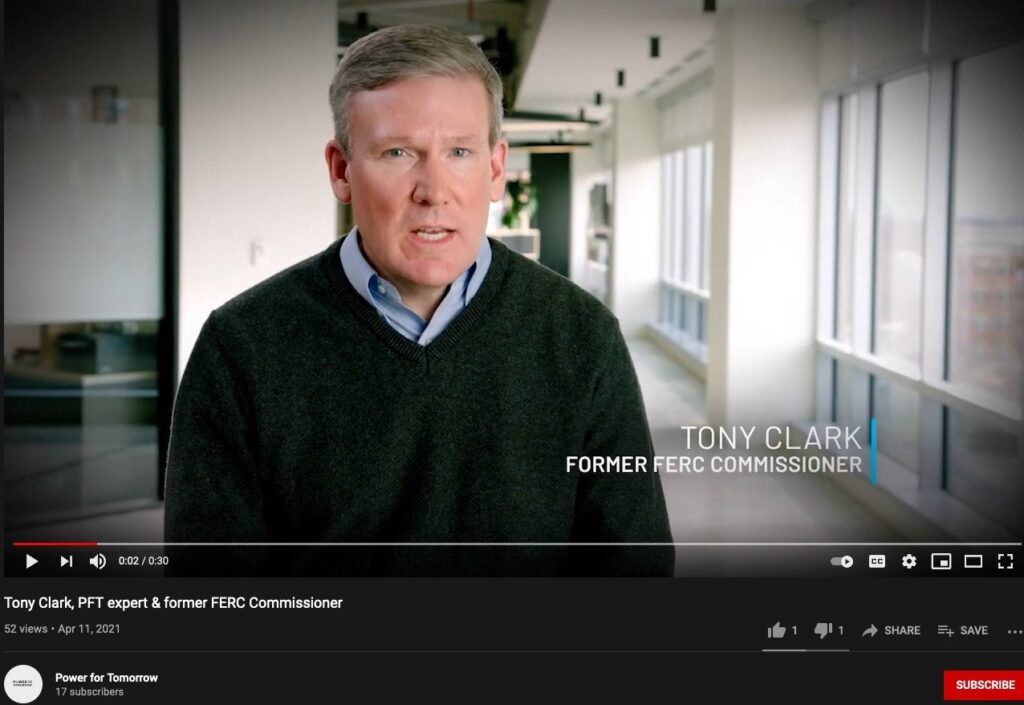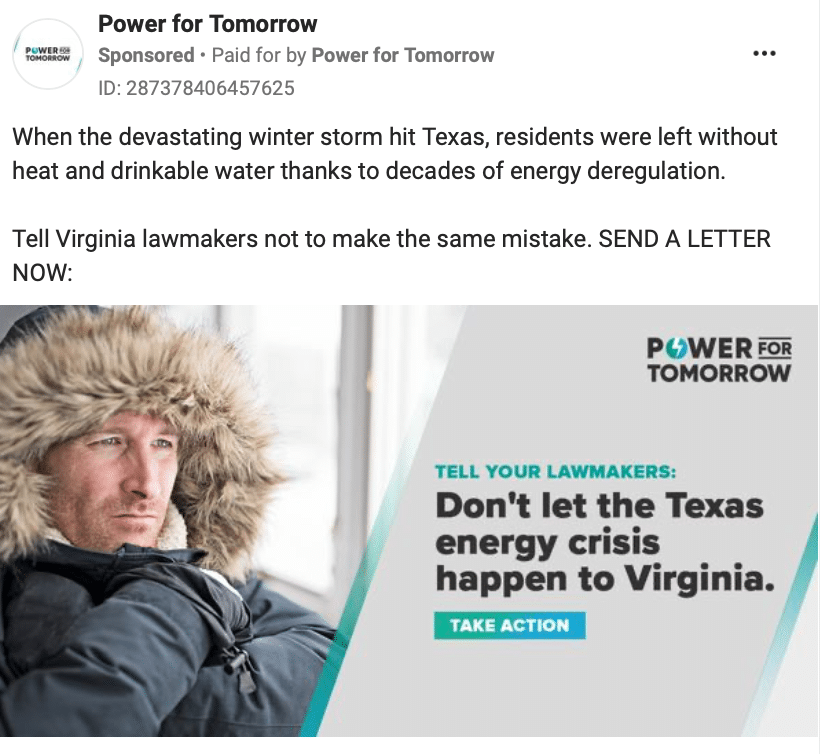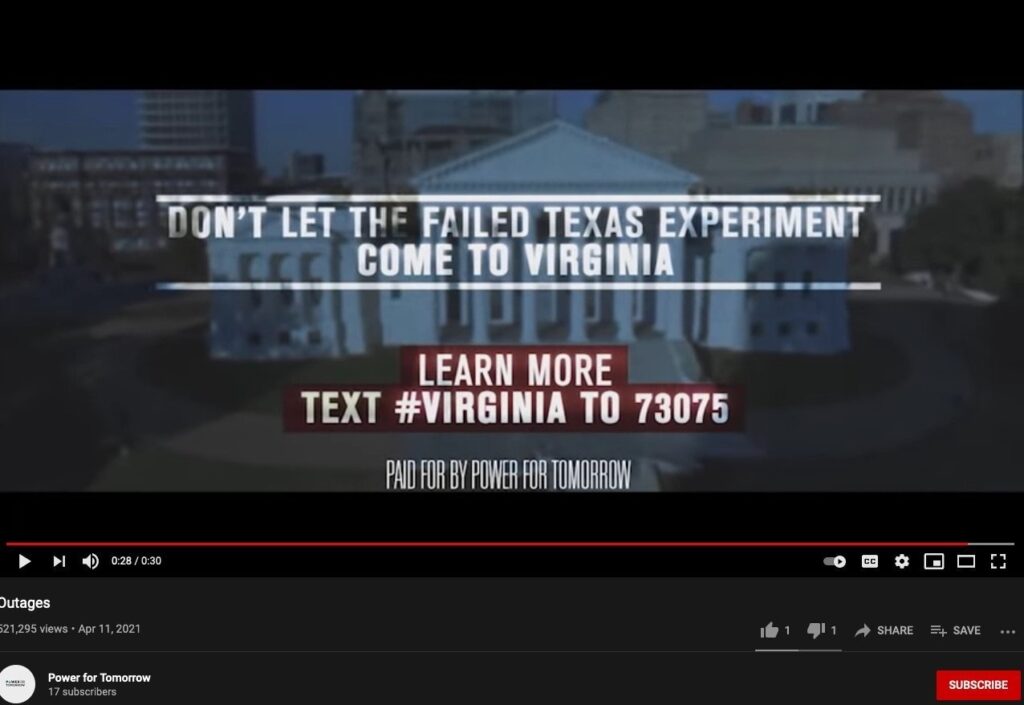Power for Tomorrow
Power for Tomorrow is a Virginia-based and utility funded group that opposes efforts to introduce greater competition to monopoly utilities and provides a platform for former regulators to advocate for utility interests. The group was first connected to Dominion Energy in May 2021 and received at least $50,000 from Southern Company and at least $792,511 from Dominion in 2021. Power for Tomorrow also revealed receiving an undisclosed amount funding from Entergy in an opinion piece to NOLA.com arguing against wholesale electric competition in September 2022.
Power for Tomorrow says on its site that “[T]he tragedy in deregulated Texas after Winter Storm Uri catalyzed the launch of PFT,” but the powerfortomorrow.org domain was actually registered in November 2019, and the site launched in October 2020, according to a Daily Energy Insider article. It was taken offline in early 2021 before relaunching in March with the new language about being “catalyzed” by the Texas storm.
Power for Tomorrow posted a white paper defending vertically integrated utilities’ monopoly status on the site by three members of the law firm Wilkinson Barker Knauer, LLP – Tony Clark, Ray Gifford, and Matt Larson – who are also listed as experts on the site, and were described as “experts behind [the] new website” last November.
Clark, Gifford and Larson released the paper at a time when lawmakers and regulators in states such as Arizona, North Carolina, South Carolina, and Virginia were discussing the possibility of restructuring.
Clark is a former FERC Commissioner and Commissioner of the North Dakota Public Service Commission. Gifford was a Commissioner at the Colorado Public Utilities Commission. Both have advocated on behalf of investor-owned utilities since leaving office. Clark has written op-eds echoing the industry’s position against net metering, and warning FERC against “a path of confrontation” with utilities.

Gifford testified in 2019 on behalf of FirstEnergy Solutions in support of House Bill 6, the highly controversial $1.4 billion bailout of its uncompetitive nuclear and coal plants. In 2020, federal prosecutors charged the Ohio Speaker of the House, along with several lobbyists, on charges that the group used $60 million of funds provided by FirstEnergy in exchange for passing the law. In 2017, Gifford joined former FirstEnergy CEO Chuck Jones to meet with FERC Commissioner Neil Chatterjee to discuss a previous federal effort to provide a bailout to coal and nuclear plants, the Grid Reliability and Resilience Pricing NOPR, which failed.
Wilkinson, Barker, Knauer, LLP’s clients include electric and gas utilities and associations. In recent years those included FirstEnergy, NextEra, and the American Public Power Association.
Other experts listed on Power for Tomorrow’s website represent utility interests. They include:
- Elin Katz, an attorney who is currently vice president of the utilities sector for the firm Tilson. Some of Tilson’s recent clients include Avangrid and a number of utilities in Vermont. Katz previously headed Connecticut’s Office of Consumer Counsel.
- Glenn Ivey, a partner at Ivey & Levetown, whose utility sector work includes “internal investigations and… crisis management response for gas companies, utilities and telecommunications companies in the United States and abroad.” Ivey previously served on the Maryland Public Service Commission.
Power for Tomorrow’s Advertisements about the Texas Blackouts
Power for Tomorrow’s website does not disclose its members or its sources of funding.
The group registered on March 17, 2021 with the Virginia’s State Corporation Commission business registrar as Power 4 Tomorrow, Inc, posting a downtown Arlington address. It listed three directors, Gary Meltz (secretary and treasurer), Brian Doory (chairman), and Brian Rogers (vice chairman).
Doory is a veteran democratic political campaigner and public affairs consultant. He is currently a partner with Compass, an Annapolis, MD-based lobbying and PR firm. Compass’ lobbying clients in Maryland include the utility NextEra as well as a number of renewable energy groups.
Doory is also a senior advisor with Scarlet Oak Strategies, a Washington, DC-based public relations firm. Scarlet Oak Strategies’ clients include the Edison Electric Institute, the trade association representing investor-owned utilities, and the utility National Grid. The founder and CEO of Scarlet Oak Strategies, Raymond Glendening, is the son of Parris Glendening, a former governor of Maryland who is also listed on Power for Tomorrow’s website as one of the group’s experts.
Gary Meltz is the principal at the Washington, DC-based Meltz Communications, LLC, which bills itself as a “a boutique crisis management and communications firm.” Meltz previously worked as senior vice president at Dezenhall Resources. In the early 2000s, Dezenhall Resources worked for ExxonMobil to attack Greenpeace through a front group. In 2017 and 2018, Dezenhall Resources worked for the American Fuel and Petroleum Manufacturers, IRS forms show. Before Dezenhall Resources, Meltz worked as press secretary for New York Democratic Congressman Eliot Engel.
Power for Tomorrow has used the devastating power outages in Texas and in the midwest during the winter of 2021 to advocate against utility deregulation. It created a Facebook page on March 21. As of April 1, 2021, the group spent $19,737 on Facebook advertisements.

The Facebook ads exclusively target users in Virginia and urge residents to oppose bills in the state’s legislature that would introduce wholesale market competition, and which the state’s large investor-owned utilities oppose. “Don’t let the Texas energy crisis happen in Virginia,” one of the ads proclaims alongside an image of a man bundled in a winter parka.

The group also aired TV ads in Virginia. According to Federal Communications Commission disclosures, the ads express “concern Virginia lawmakers may pursue deregulation of the energy industry.
On April 7, 2021 Power for Tomorrow’s Brian Doory registered as a lobbyist in Virginia. Doory, who registered with his Scarlet Oak Strategies email account, stated the he’ll be lobbying on “Promoting sensible regulation of electric utilities.”

Meanwhile, the group also added an online letter users can send to Virginia lawmakers in opposition to utility deregulation. The letter’s platform is run by the the online advocacy firm Phone 2 Action, which has worked for EEI.
Power for Tomorrow’s Ad Spending
Utilities continue to stall and limit climate action by funding front groups to spread climate misinformation and false solutions to solve the crisis through advertising on social media networks.
Using data from the Meta Ad Library API and existing code from Brown University, EPI created a tool to expose the amount Power for Tomorrow is spending on advertisements about social issues, elections, or politics across Meta technologies, along with the specific regions the advertisements target.

